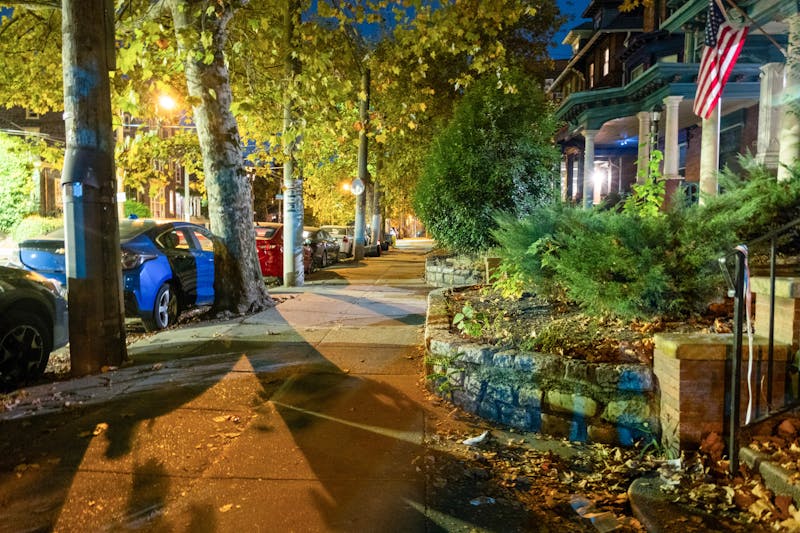I was definitely in the minority when I walked into my first class of the semester last week. The course was the Civil War and Reconstruction, the students overwhelmingly male. I quietly panicked that I would spend the semester recounting battles in gruesome detail and fighting to get a word in edgewise in testosterone-driven recitations.
As soon as the professor walked in, I realized he was in the minority as well in a lecture hall filled with white faces. Robert Engs is one of four black professors in a History department with almost forty appointments. He's also the only black teacher I've taken a class from in six semesters at Penn. As he explained his objectives for the course, I realized I was in for something completely different than I imagined.
How was it possible I had never taken a class from a black professor before? It's a well-known fact that minority faculty are underrepresented at Penn and across the Ivy League. According to Penn's 2005 Minority Equity Report - the most recent comprehensive look at minority faculty recruitment - minorities make up about 14 percent of faculty across all schools; blacks hold 3.1 percent of all appointments.
Engs's Civil War class is cross-listed as one in the Africana Studies program, an interdisciplinary major that stems out of, appropriately, the Center for Africana Studies. Engs said that the Center is not only an important intellectual hub on campus, but an important tool for attracting minority faculty to work at Penn.
The Center does "a really good job of meeting with faculty of color, especially African-American faculty, who come in for [job] interviews," said Marybeth Gasman, a professor in the Graduate School of Education who is affiliated with the Center. It makes "sure that [applicants] know that there's a place for them to feel comfortable, to have academic stimulation and social stimulation."
Classes like the one I'm taking this semester - that emphasize race issues in a variety of disciplines - are part of a growing sentiment in American academia that we need to look beyond dead white men.
But it's not entirely clear that students want what the Center for Africana Studies has to offer. The University has certainly improved its minority faculty presence. But Engs told me, "I think more problematic, is whether or not students are taking advantage of us."
Engs recounted a story that when he taught the same Civil War class about a decade ago, some of his students - likely expecting the same battle-by-battle version of the war I was initially afraid of - got up and left on the first day of class after they saw a black professor standing behind the lectern. It's not that they were out-and-out racist, Engs hypothesized, but rather that they assumed the class would focus on slavery rather than our nation's glorious military history.
"Without knowing whether it's true or not, [students] assume there's going to be a particular ideological bias," Engs said.
Just a look at the most popular classes in the History department shows that maybe Engs is on to something. The History of the South - a popular class taught by former University President Sheldon Hackney - draws in huge numbers of white men, according to Engs, even though it covers much of the same material he discusses in his tiny Introduction to Afro-American History class.
Pulitzer Prize-winner and department star Stephen Hahn taught me in a packed introductory American History class my freshman year; the following semester, Hahn's class called the Black Atlantic could barely fill a seminar room.
"It's not entirely students opting to not talk about race," Engs said. "It's opting to not talk about the unpleasantness of it."
I'm the first to admit that the history of slavery is, to put it lightly, depressing. Just flipping through the books Engs has assigned us is enough to discourage even the most dedicated history students. And as open-minded as I like to think I am, I still can feel the tension when my classmates in mostly-white classes struggle to say words like "slave" and "Negro" when quoting passages from the reading. It just seems a lot easier to not say them at all.
It's precisely because race issues are so difficult to discuss that we have an obligation to do so. I'm not perfect -I tend to write my papers on benign cultural history, not the most brutal chapter in our nation's. But I'm working on it, and it seems like the first black professor I've ever taken a class from might be able to help.
Mara Gordon is a College junior from Washington, D.C. Her e-mail address is gordon@dailypennsylvanian.com. Flash Gordon appears on Thursdays.
The Daily Pennsylvanian is an independent, student-run newspaper. Please consider making a donation to support the coverage that shapes the University. Your generosity ensures a future of strong journalism at Penn.
DonatePlease note All comments are eligible for publication in The Daily Pennsylvanian.







